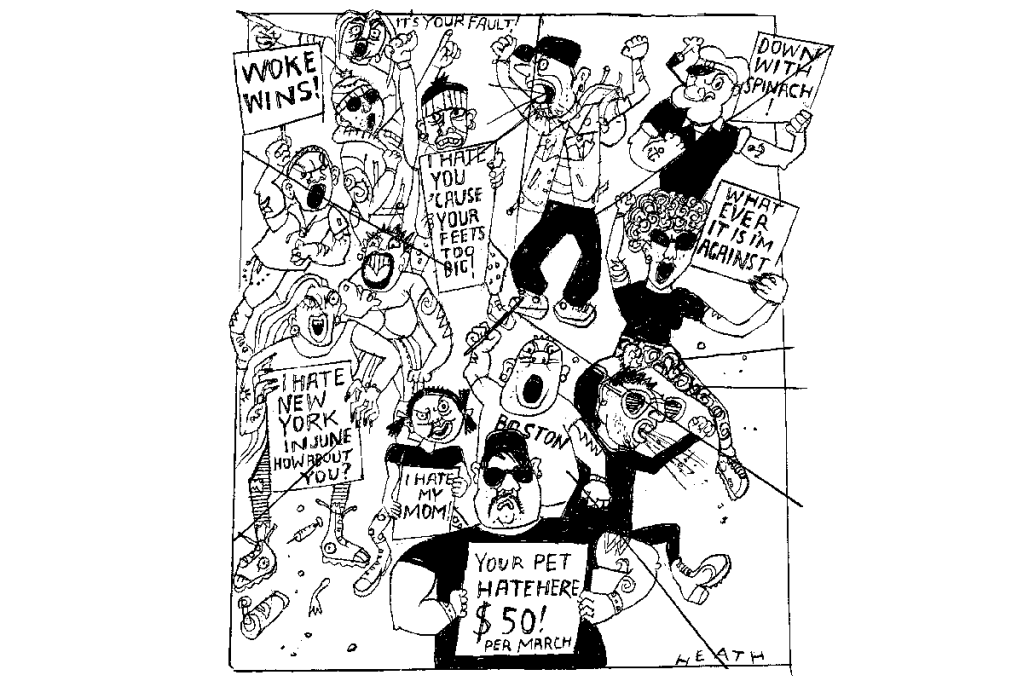‘If you hate wokeness, you should vote for Joe Biden.’ So said writer and academic Yascha Mounk in the Atlantic in the run-up to last November’s elections. It was a sentiment that echoed across what we might call the respectable anti-woke world: that Trump is to identity politics what kerosene is to a dumpster fire, so a win for the moderate Joe Biden would calm everyone down.
As predictions go, it’s right up there with Trump saying the pandemic would be over with by Easter 2020: it’s been proven spectacularly wrong, remarkably quickly. Trump may well have been the perfect foil for the identitarian movement, but the even older, whiter guy who beat him makes an unlikely tribune.
Biden’s presidency has done nothing to abate racial paranoia. On the contrary, it’s getting more feverish. We’ve seen the New York Times dispense with its star COVID reporter because he once used the ‘n-word’ in a private discussion about racist language. Teen Vogue ditched its new editor over jokes she made about Asians on Twitter as a teenager. And six Dr Seuss books have been withdrawn, never to be printed again, over ‘racist images’.
No issue, it seems, can be too silly or too serious to be left unracialized. After two horrendous mass shootings in March, in Atlanta and Boulder, the bodies were barely cold before they had been presumptively declared victims of ‘white supremacist domestic terrorism’, as that authority on extremism, Rosanna Arquette, wrote hours after the Boulder shootings.
The Atlanta shooter targeted Asian-run massage parlors but the FBI said it did not believe the white, sex-crazed killer was racially motivated. The new Georgia senator Raphael Warnock disagreed: ‘We all know hate when we see it.’ The same story was spun about Boulder, where 10 people had been gunned down in a grocery store — until the suspect turned out to be a Syrian American named Ahmad Al Aliwi Alissa.
Racism has become a kind of theory of everything for the American cognoscenti. This faith has its roots in academia and ‘critical race theory’, which holds that little real progress has been made since the Sixties and that racism remains structurally, culturally and psychologically ingrained in American society. According to this worldview, racism is everywhere, yet often invisible. Confronting its myriad manifestations — real or imagined, historical or contemporary — apparently requires constant, hair-trigger vigilance.
This thinking has been mainstreamed recently by a clutch of best-selling authors, notably Ibram X. Kendi and Robin DiAngelo, who have boiled it down to a series of pat slogans. In Kendi’s formulation, ‘There is no such thing as a not-racist idea, only racist ideas and antiracist ideas.’ Such a Manichaean worldview is a recipe for hysteria. And in this, America’s colleges continue to lead the way.
In January the UIC John Marshall Law School in Chicago put Professor Jason Kilborn on indefinite leave and barred him from campus after students claimed to be ‘incredibly upset’ by one of his exam papers. The paper, describing a discrimination case, featured the ‘n-word’, written ‘n_____’ for sensitivity’s sake. Kilborn arranged a Zoom meeting with one of the offended students, to smooth things over. He joked that the dean might think he (Kilborn) was ‘homicidal’. According to Kilborn, the student then told the campus authorities that he really was homicidal, thus triggering his expulsion from campus.
The woke left used the killing of George Floyd last year to push identity politics out of the colleges and into the streets. In a moment of collective horror at what appeared to be a brutal, racist murder, identitarians offered compellingly simplistic answers.
This was not one horrific incident, or even reflective of one specific problem, they said: it was just the most extreme end of everyday white racism. This spectrum goes, according to a writer in TIME, from white people complimenting black women on ‘how pretty our hair looks when we wear it straight’ to cops ‘literally suffocating black people’.
There was an explicit attempt to foster a sense of white collective guilt for Floyd’s death. ‘White people, you are the problem’, thundered an op-ed in the Chicago Tribune. This was followed by creepy public displays of penance. In Bethesda, Maryland, a group of whites held their arms up and pledged to tackle ‘racism, anti-blackness or violence’ and to ‘do everything in my power to educate my community’. In North Carolina white pastors washed the feet of black pastors while begging God for forgiveness.
Heretics were purged and statues toppled with religious fervor. David Shor, a progressive data analyst, lost his job at a consultancy firm after he tweeted the results of a paper claiming to show that race riots might hurt the Democrats electorally. Even expressing fealty to Black Lives Matter in insufficient detail got some people canceled: the president and board chairman of the Poetry Foundation were forced to resign because their post-Floyd statement of solidarity was deemed too brief to be taken seriously.
All this vindicates what John McWhorter, the linguist and dissident on race issues, has been saying for a while: anti-racism has become a religion — not like a religion but actually a religion, complete with a doctrine of original sin, a gospel to be imbibed and a pretty hard line on heresy. Hence not only the zealotry of this movement but also its remarkable pessimism. Just as original sin must be reckoned with but cannot be overcome, McWhorter writes, nor can the taint of ‘white privilege’. Penance means acts of ritualized self-flagellation. The anti-racist movement has drifted, he says, ‘from a commitment to changing society to a narrower commitment to signaling antipathy to racism and leaving it there’.
Last summer, wokeness cemented itself as the new established faith. Corporate America fell in spectacular fashion, with Apple, Nike, Coca-Cola and others all pledging their allegiance to the Black Lives Matter movement. They all engaged in hollow performances that required them to give up nothing other than their dignity — something summed up by the photo of Jamie Dimon, the CEO of JPMorgan Chase, taking the knee in front of a Chase bank vault.
Even under Trump these ideas crept into the federal bureaucracy. Last year the investigative journalist Christopher Rufo published documents suggesting that the Treasury Department, the FBI and the Department of Homeland Security had all paid consultants huge sums of money to lecture their staff on race and privilege. In 2019, Sandia National Laboratories, which designs America’s nuclear arsenal, sent some white male employees to a reeducation retreat where they were asked to write apologetic letters to women and minorities.
Rufo’s research informed Trump’s decision to issue an executive order banning Critical Race Theory in the federal government. With academia, the cultural elite and big business apparently united under this new ideology, the presidency was the last domino to fall. And while Joe Biden has constantly appealed to unity, he continues to indulge this divisive movement.
One of Biden’s first acts as president was to rescind Trump’s ban on critical race theory. He drops the usual buzzwords, from ‘systemic racism’ to ‘equity’. And he even joined in the cancellation of Dr Seuss, by removing any mention of him from the presidential proclamation on Read Across America Day, which marks Dr Seuss’s birthday.
There is a tendency among some to see left identity politics as silly but harmless — as taking the right ideas just a bit too far. We need to disabuse ourselves of this notion. Wokeness is the ‘acceptable’ means through which racial thinking is being peddled today. Its high priests see the experiences and interests of blacks and whites as irreconcilably different. As Robin DiAngelo puts it in White Fragility, ‘I have a white frame of reference and a white worldview, and I move through the world with a white experience.’ Meanwhile, black people are portrayed as permanent victims.
Racial stereotypes are being rehabilitated in politically correct form. Last year the Smithsonian’s National Museum of African American History and Culture released an educational guide to talking about race, in which it said that ‘hard work’, ‘politeness’ and ‘objective, rational linear thinking’ were examples of ‘white culture’. It’s a claim many white racists would enthusiastically agree with.
Slowly but surely the idea that blacks and whites need to be separated for their own safety or self-fulfillment is once again taking hold. In September, Ibram X. Kendi went on a tirade against interracial adoption, suggesting that Amy Coney Barrett was a ‘white colonizer’ who wanted to ‘civilize’ her adopted Haitian children.
A form of soft segregation is creeping in. In 2019, a National Association of Scholars report claimed that more than 75 US colleges offer segregated graduation events. Black students at NYU recently petitioned the university for black-only student housing to provide them with a ‘safe space’. ‘Too often in the classroom and in residential life, black students bear the brunt of educating their uninformed peers about racism,’ they said.
This is not a movement that has its heart in the right place but is just getting a bit carried away. It is a movement that trades in notions of collective racial guilt, that presumes only white people are polite, hardworking and rational, and that is even skeptical about mixed-race families. There used to be a word for this.
Woke politics is ugly and destructive. It does nothing to improve the lot of hard-up minorities because it is obsessed with language, etiquette and elite institutions, rather than ordinary people’s lives. Its rigid notions of group-based privilege and victimhood are as likely to obscure class inequalities as expose them. All it has achieved is to plunge America into racial paranoia, and to call into question the old civil-rights ideals of color-blindness: the hope that one day people would ‘not be judged by the color of their skin but by the content of their character’, as Martin Luther King so beautifully put it.
Indeed, phrases like ‘I don’t believe in race’ or ‘America is a melting pot’ often appear in lists of racial ‘microaggressions’, because they allegedly downplay racism. And these ideas are no longer confined to college campuses: workers at the DHS were reportedly taught all this at a training session last year.
For years we have read about the terrifying rise of the racist right. But while the marchers in Charlottesville or the far-right stormers of the Capitol are undoubtedly scumbags, they hold no real power or institutional clout. The future clearly does not belong to them. The identitarian left, meanwhile, dominate the media, academic and business elites — and now they’ve got the presidential seal of approval too. Having dispensed with MLK’s dream, America seems doomed to endure a new kind of nightmare.
This article was originally published in The Spectator’s May 2021 World edition.


















